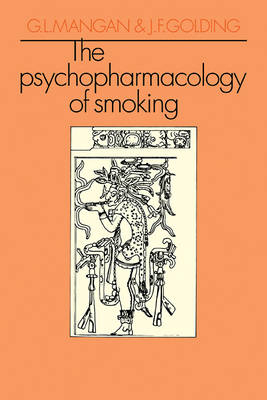
The Psychopharmacology of Smoking
Seiten
2009
Cambridge University Press (Verlag)
978-0-521-10590-3 (ISBN)
Cambridge University Press (Verlag)
978-0-521-10590-3 (ISBN)
This book examines why individuals smoke and looks at the complex interaction between the toxicology of smoking and genetically based susceptibility to smoking-related disease.
Why do individuals smoke? In discussing this central question, the authors first examine a number of studies of the complex interaction between the toxicology of smoking and genetically based susceptibility to smoking-related disease, which suggest that the link between smoking and disease is more equivocal than recent epidemiological studies have claimed. Several theories of smoking recruitment and maintenance are considered and judged in the light of the known pharmacological effects of nicotine, a psychoactive drug that is the primary reinforcer in smoking. A review of psychological and behavioural evidence from animal and human studies indicates that nicotine can promote psychological comfort and performance enhancement in a variety of tasks; such effects are produced by self-titration, evidenced in smoking style, which itself is subject to some genetically imposed constraints. The effectiveness of smoking intervention and cessation strategies is assessed, and some improvements suggested, against the background of these putative smoking motives. The book is of value to pharmacologists, psychologists, and specialists in the treatment of drug abuse and in preventive health.
Why do individuals smoke? In discussing this central question, the authors first examine a number of studies of the complex interaction between the toxicology of smoking and genetically based susceptibility to smoking-related disease, which suggest that the link between smoking and disease is more equivocal than recent epidemiological studies have claimed. Several theories of smoking recruitment and maintenance are considered and judged in the light of the known pharmacological effects of nicotine, a psychoactive drug that is the primary reinforcer in smoking. A review of psychological and behavioural evidence from animal and human studies indicates that nicotine can promote psychological comfort and performance enhancement in a variety of tasks; such effects are produced by self-titration, evidenced in smoking style, which itself is subject to some genetically imposed constraints. The effectiveness of smoking intervention and cessation strategies is assessed, and some improvements suggested, against the background of these putative smoking motives. The book is of value to pharmacologists, psychologists, and specialists in the treatment of drug abuse and in preventive health.
Part I. The Universe of Discourse: Introduction; 1. The smoking/health debate; 2. Theories about smoking; Part II. The Social Pharmacology of Smoking: 3. The Psychopharmacology and psychophysiology of smoking; 4. smoking recruitment and maintenance; Part III. Prevention and Cessation: 5. Intervention and termination strategies; 6. Overview.
| Erscheint lt. Verlag | 4.6.2009 |
|---|---|
| Zusatzinfo | Worked examples or Exercises |
| Verlagsort | Cambridge |
| Sprache | englisch |
| Maße | 152 x 229 mm |
| Gewicht | 400 g |
| Themenwelt | Medizin / Pharmazie ► Medizinische Fachgebiete ► Pharmakologie / Pharmakotherapie |
| Medizin / Pharmazie ► Medizinische Fachgebiete ► Suchtkrankheiten | |
| ISBN-10 | 0-521-10590-0 / 0521105900 |
| ISBN-13 | 978-0-521-10590-3 / 9780521105903 |
| Zustand | Neuware |
| Haben Sie eine Frage zum Produkt? |
Mehr entdecken
aus dem Bereich
aus dem Bereich
Arzneimittelverzeichnis für Deutschland (einschließlich …
Buch | Hardcover (2024)
Rote Liste Service GmbH (Verlag)
CHF 149,95
Englisch für Apotheker und PTAs
Buch | Spiralbindung (2024)
Kohlhammer (Verlag)
CHF 44,75


